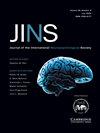晚年抑郁症患者的焦虑与多个认知领域的较差表现有关
IF 2.6
4区 心理学
Q2 CLINICAL NEUROLOGY
Journal of the International Neuropsychological Society
Pub Date : 2024-09-18
DOI:10.1017/s1355617724000262
引用次数: 0
摘要
目的:焦虑是晚年抑郁症(LLD)的常见并发症,与抑郁症的严重程度无关,与较差的整体认知功能有关。然而,人们对合并焦虑症是否与认知功能障碍的特定领域模式有关却知之甚少。因此,我们研究了多个领域认知功能表现的组间差异(伴有和不伴有焦虑的晚期抑郁症患者)。研究方法对患有重度抑郁症的老年人(228 人,年龄 65-91 岁)的焦虑和抑郁严重程度以及认知功能(学习、记忆、语言、处理速度、执行功能、工作记忆和视觉空间功能)进行评估。在对年龄、性别、教育程度和并发抑郁严重程度进行调整后,普通最小二乘法回归检验了焦虑组在认知功能测试中的表现差异。结果显示在对抗命名和视觉空间功能以及言语流畅性、工作记忆和抑制能力方面出现了显著的组间差异,在控制抑郁严重程度的情况下,合并焦虑症的 LLD 与仅合并焦虑症的 LLD 相比表现较差。结论在患有 LLD 并合并焦虑症的老年人中发现的表现模式类似于老年神经退行性疾病中常见的神经心理学特征。这些发现对解释神经心理学特征时的病因学考虑具有潜在的意义。本文章由计算机程序翻译,如有差异,请以英文原文为准。
Anxiety in late-life depression is associated with poorer performance across multiple cognitive domains
Objective: Anxiety is a common comorbid feature of late-life depression (LLD) and is associated with poorer global cognitive functioning independent of depression severity. However, little is known about whether comorbid anxiety is associated with a domain-specific pattern of cognitive dysfunction. We therefore examined group differences (LLD with and without comorbid anxiety) in cognitive functioning performance across multiple domains. Method: Older adults with major depressive disorder (N = 228, ages 65–91) were evaluated for anxiety and depression severity, and cognitive functioning (learning, memory, language, processing speed, executive functioning, working memory, and visuospatial functioning). Ordinary least squares regression adjusting for age, sex, education, and concurrent depression severity examined anxiety group differences in performance on tests of cognitive functioning. Results: Significant group differences emerged for confrontation naming and visuospatial functioning, as well as for verbal fluency, working memory, and inhibition with lower performance for LLD with comorbid anxiety compared to LLD only, controlling for depression severity. Conclusions: Performance patterns identified among older adults with LLD and comorbid anxiety resemble neuropsychological profiles typically seen in neurodegenerative diseases of aging. These findings have potential implications for etiological considerations in the interpretation of neuropsychological profiles.
求助全文
通过发布文献求助,成功后即可免费获取论文全文。
去求助
来源期刊
CiteScore
5.40
自引率
3.80%
发文量
185
审稿时长
4-8 weeks
期刊介绍:
The Journal of the International Neuropsychological Society is the official journal of the International Neuropsychological Society, an organization of over 4,500 international members from a variety of disciplines. The Journal of the International Neuropsychological Society welcomes original, creative, high quality research papers covering all areas of neuropsychology. The focus of articles may be primarily experimental, applied, or clinical. Contributions will broadly reflect the interest of all areas of neuropsychology, including but not limited to: development of cognitive processes, brain-behavior relationships, adult and pediatric neuropsychology, neurobehavioral syndromes (such as aphasia or apraxia), and the interfaces of neuropsychology with related areas such as behavioral neurology, neuropsychiatry, genetics, and cognitive neuroscience. Papers that utilize behavioral, neuroimaging, and electrophysiological measures are appropriate.
To assure maximum flexibility and to promote diverse mechanisms of scholarly communication, the following formats are available in addition to a Regular Research Article: Brief Communication is a shorter research article; Rapid Communication is intended for "fast breaking" new work that does not yet justify a full length article and is placed on a fast review track; Case Report is a theoretically important and unique case study; Critical Review and Short Review are thoughtful considerations of topics of importance to neuropsychology and include meta-analyses; Dialogue provides a forum for publishing two distinct positions on controversial issues in a point-counterpoint format; Special Issue and Special Section consist of several articles linked thematically; Letter to the Editor responds to recent articles published in the Journal of the International Neuropsychological Society; and Book Review, which is considered but is no longer solicited.

 求助内容:
求助内容: 应助结果提醒方式:
应助结果提醒方式:


